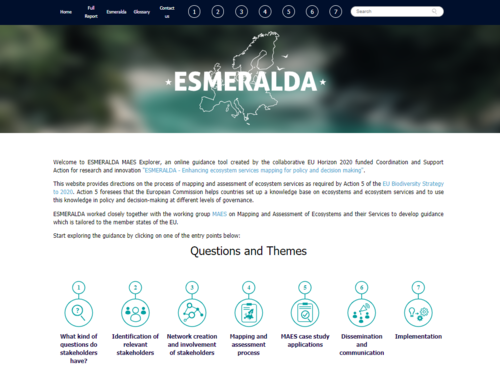The recently introduced online resource – the ESMERALDA MAES Explorer – aids decision-makers from policy, science and society to implement Mapping and Assessment of Ecosystems and their Services (MAES) at different levels. MAES can reach from national policy to local spatial planning or businesses, who want to support sustainable resource use and understand the condition of ecosystems, their ability to provide services and the socio-cultural and economic values related to them.
The online guidance tool is created by the collaborative EU Horizon 2020 funded Coordination and Support Action “ESMERALDA – Enhancing ecosystem services mapping for policy and decision making” to showcase major project results and to make them available Open Access, in support of Action 5 of the EU Biodiversity Strategy to 2020.
Together with the EU MAES Working Group MAES, ESMERALDA developed the platform to share the project’s broad experience and to direct EU Member states, and other countries alike, through the process of mapping and assessment of ecosystems and their services.
Starting from various questions arising from policy, business or society, through supporting stakeholder identification and related network creation, the ESMERALDA MAES Explorer provides ESMERALDA-derived practical guidance to mapping and assessment of ecosystems and their services, all the way to dissemination of respective outcomes and their implementation in policy and decision making.

The MAES Explorer also links to the ESMERALDA MAES Methods Explorer – an interface that allows users to explore the comprehensive methods database created within ESMERALDA. The purpose of this database it to collect the majority of available methods to map and assess ecosystem services. Its aim is also to link those methods to specific ecosystem types, ecosystem services, questions from policy, business and society, tiers and practical case studies.
“To ensure the perennity of the excellent project results available in the ESMERALDA MAES Explorer, we decided to cooperate with large information hubs and integrate crucial findings to external platforms, so they will be online after the actual project will have ended,” says project Coordinator Prof. Benjamin Burkhard, Leibniz Universität Hannover, Germany.
Based on regular stakeholder meetings, the consortium decided to integrate the online guidance tool to the Ecosystem Services Partnership (ESP) platform. With more than 20 000 visitors in the past year, an audience of over 3000 newsletter subscribers, and a total of 6000+ followers on its social media channels, ESP has proven itself to be a suitable host for the ESMERALDA MAES Explorer. The common future strategy will sustain and expand the ESMERALDA stakeholder network after the project lifetime with the ultimate goal to support EU Member States and local practitioners in achieving and delivering their part towards Action 5 Target 2 of the EU Biodiversity Strategy.
To access the ESMERALDA MAES Explorer, click here.
(Source: ESMERALDA Project official website)
